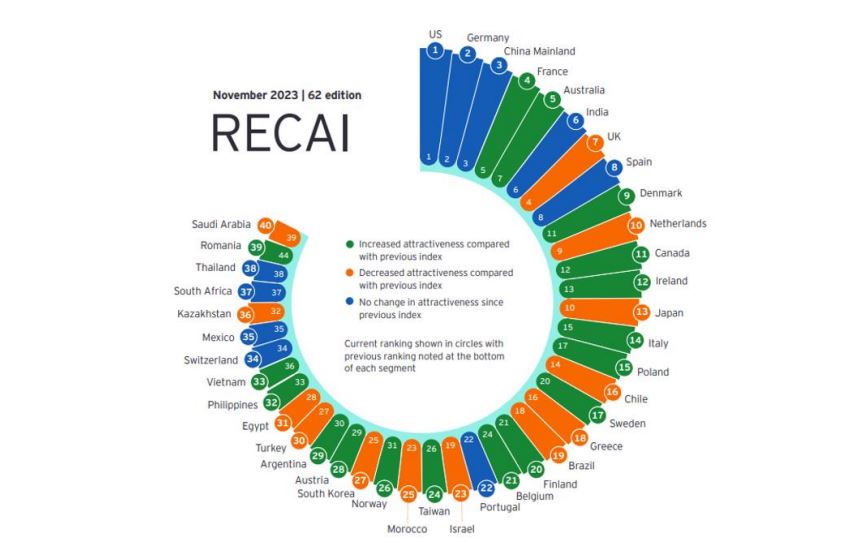Australia has risen to fifth position in the 62nd edition of EY’s biannual Renewable Energy Country Attractiveness Index (RECAI). This is up from seventh place in the previous index and comes on the back of what the report describes as a “series of positive renewable energy and related infrastructure developments.”
“Australia has granted federal approval for one of the world’s largest batteries to be built at the Melbourne Renewable Energy Hub,” EY said, adding that the decision “signals a breakthrough for energy storage” in Australia.
EY also noted that the federal government has “earmarked up to $3 billion (USD 1.97 billion) from the National Reconstruction Fund for renewables manufacturing to combat supply chain challenges.”
The release of the report follows the federal government’s recent announcement that it would expand its Capacity Investment Scheme (CIS) to drive the development of new renewable energy projects as it seeks to achieve its target of generating 82% of Australia’s electricity from renewable sources by 2030.
The revised CIS, announced late last month, will ramp up from 6 GW of storage to more than 9 GW of dispatchable capacity, and will add 23 GW of variable renewable energy generation. Currently, Australia boasts about 32 GW of renewable energy within its grid.
“The country has set itself ambitious targets to increase the share of energy produced from renewable sources and, as indicated by the recent government measures announced, to facilitate access to these sources,” EY said in a statement.
Since 2003, the biannual RECAI has ranked the world’s top 40 markets on the attractiveness of their renewable energy investment and deployment opportunities.
Australia’s fifth place ranking on the index, with a RECAI score of 70.2, places it behind the United States with 73.9, Germany (71.4), China (71.4) and France (70.6). Rounding out the top 10 are India (69.2), the United Kingdom (68.3), Spain (67.1), Denmark (66.3) and the Netherlands (66.1).
EY said Australia has performed even more impressively in the “normalised index” which takes the gross domestic product (GDP) of each nation into account.
“In this way, the normalised index helps reveal ambitious plans for energy transition in smaller economies, creating some attractive alternatives for potential investors,” EY said.
Here, Australia has risen to fourth place, edged out by Denmark, Morocco and Greece.
Australia has also maintained its ranking in the power purchase agreements market, remaining steady in sixth place as “more and more corporates” target new deals.
This content is protected by copyright and may not be reused. If you want to cooperate with us and would like to reuse some of our content, please contact: editors@pv-magazine.com.









By submitting this form you agree to pv magazine using your data for the purposes of publishing your comment.
Your personal data will only be disclosed or otherwise transmitted to third parties for the purposes of spam filtering or if this is necessary for technical maintenance of the website. Any other transfer to third parties will not take place unless this is justified on the basis of applicable data protection regulations or if pv magazine is legally obliged to do so.
You may revoke this consent at any time with effect for the future, in which case your personal data will be deleted immediately. Otherwise, your data will be deleted if pv magazine has processed your request or the purpose of data storage is fulfilled.
Further information on data privacy can be found in our Data Protection Policy.